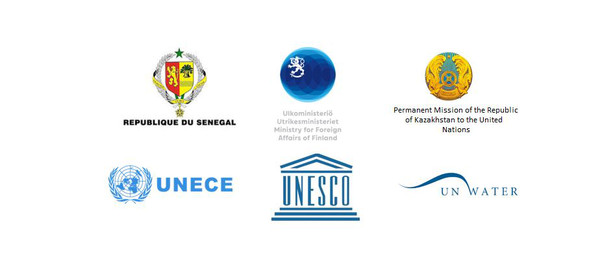The contribution of transboundary water cooperation to achieving the sustainable development goals – How far have we come, and what still needs to be done?
Transboundary water cooperation is a critical component to ensuring water and sanitation for all (SDG6) and an important requirement and catalyst for achieving other SDGs on poverty, food security, health and wellbeing, sustainable energy, climate action, ecosystem protection and peace. In transboundary basins where cooperation is lacking, it will be hard to achieve sustainable development for all.
Results from the first reporting exercise on indicator 6.5.2 on transboundary water cooperation highlight that an acceleration in strengthening transboundary water cooperation is urgently needed to be able to face growing water challenges and prevent conflicts on water use.
Building on the outcomes of the first SDG indicator 6.5.2 reporting exercise, the HLPF side event, jointly organized by Senegal, Finland, Kazakhstan, UNECE and UNESCO, discussed the following:
- Where do we stand on transboundary water cooperation? What are the progress, gaps and challenges?
- What kind of good practices and success stories can be replicated to accelerate progress?
- How external factors, such as the global water conventions and financing, can support negotiation and effective implementation of transboundary water arrangements?
Programme
• Welcome and introduction, H.E. Mr. Cheikh Niang, Permanent Representative of Senegal to the United Nations
• The importance of transboundary cooperation for peace and development: Senegal experience, Mr. Thierno Hamet Baba Ly, Secretary General of the Ministry of Water and Sanitation, Senegal (PDF)
• Why is international water law important in fostering cooperation – a Finnish perspective of the key transferable deliverables, Ms. Jaana Husu-Kallio, Permanent Secretary, Ministry of Agriculture and Forestry, Finland
• The importance of transboundary water cooperation for regional integration and connectivity: lessons learned from bilateral and multilateral cooperation in Central Asia, H.E. Mr. Kairat Umarov, Permanent Representative of the Republic of Kazakhstan to the United Nations
• Outcomes of the first SDG indicator 6.5.2 reporting exercise and the role of the Water Convention to promote transboundary water cooperation, Ms Olga Algayerova, Under Secretary-General, Executive Secretary of the United Nations Economic Commission for Europe (PDF)
• Future work related to indicator 6.5.2 and the role of UNESCO International Hydrological Programme, Mr. Anil Mishra, Programme Specialist, International Hydrological Programme, United Nations Educational, Scientific and Cultural Organization (PDF)
• How can transboundary cooperation enhance the financing of basin development? What are the challenges? Ms. Christina Leb, Senior Water Resources Specialist, World Bank
Moderation: Mr. Seppo Rekolainen, Director, Ministry of Agriculture and Forestry, Finland
Transboundary Water Cooperation's contribution to the SDGs - key insights from the first SDG6.5.2 reports (flyer)
A news article is available here.
Organizers
The side event was jointly organized by Senegal, Finland, Kazakhstan, UNECE and UNESCO.

